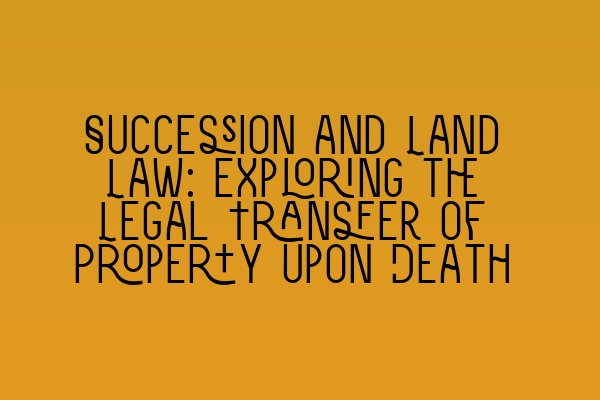Succession and Land Law: Exploring the Legal Transfer of Property upon Death
Welcome to SQE Property Law & Land Law, your trusted source for all your property law needs. Today, we delve into the fascinating world of succession and land law, exploring the legal nuances of property transfer upon the unfortunate event of death.
When a loved one passes away, the issue of what happens to their property often arises. Succession and land law govern the transfer of property rights from the deceased to their beneficiaries. It is a complex area of law, requiring careful consideration and expert guidance.
The Basics of Succession and Land Law
One of the fundamental principles of land law is that property is transferred through a legal process called conveyancing. This process involves the transfer of the legal title from one person to another.
Upon death, the property of the deceased must pass to the rightful beneficiaries. The transfer of property in such cases is governed by the laws of succession. These laws determine who inherits the property and in what proportion.
The laws of succession can vary depending on jurisdiction, so it is essential to seek advice from a qualified solicitor who specializes in property law. At SQE Property Law & Land Law, our team of expert solicitors can guide you through the complexities of succession and ensure a smooth transfer of property.
The Role of Wills in Succession
Creating a valid will is one of the most important things you can do to ensure your property is transferred according to your wishes upon your death. A will is a legal document that sets out how your assets, including property, should be distributed after you pass away.
Wills play a crucial role in succession planning, allowing you to choose the beneficiaries of your property and specify how it should be divided. Without a valid will, the laws of intestacy will come into play, and the distribution of your property may not align with your intentions.
If you have not yet created a will or need to update an existing one, our solicitors at SQE Property Law & Land Law can provide expert advice and draft a comprehensive and legally binding document that ensures your wishes are carried out.
Probate and Estate Administration
After a person passes away, their estate must go through the process of probate and estate administration. Probate is the legal process of proving the validity of a will and obtaining the necessary permission to distribute the deceased’s assets.
During probate, the deceased’s property is assessed, debts are settled, and the remaining assets are distributed to the beneficiaries as outlined in the will. Estate administration involves managing all aspects of the deceased’s estate, including paying off outstanding debts and resolving any disputes that may arise.
Our team of experienced solicitors at SQE Property Law & Land Law can provide comprehensive probate and estate administration services, ensuring that the transfer of property is carried out efficiently and in accordance with the law.
Challenges and Disputes in Succession
Unfortunately, disputes and challenges can arise during the succession process. Contested wills, disagreements among beneficiaries, and claims against the estate are common issues that may require legal intervention.
In such cases, it is crucial to have a skilled solicitor who specializes in property law and dispute resolution on your side. At SQE Property Law & Land Law, we have extensive experience in handling succession disputes and can provide strong legal representation to protect your rights and interests.
Contact SQE Property Law & Land Law Today
Succession and land law can be complex and multifaceted. At SQE Property Law & Land Law, we are here to guide you through the legal intricacies and help ensure a smooth transfer of property upon the death of a loved one.
Contact us today to schedule a consultation with one of our expert solicitors. Together, we can navigate the world of succession and land law, providing you with the peace of mind you deserve during these challenging times.
Related Articles:
